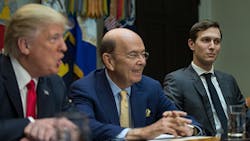President Donald Trump’s timetable to negotiate the North American Free Trade Agreement threatens to slip into an election year for Mexico, which could feel the economic impact of the uncertainty — especially if the agreement starts disintegrating.
U.S. Commerce Secretary Wilbur Ross said Wednesday that the trade talks will probably begin in the latter part of 2017 and shouldn’t last much longer than a year. “I would like the results tomorrow, but that is not the way the world works,” Ross said.
Even at that speed — and some observers warn the negotiations could take years — the uncertainty of NAFTA’s fate will likely hang over the July 2018 presidential election in Mexico, the main target of U.S. complaints.
Trump, who has said NAFTA may be the worst trade pact in global history, aims to lock down more favorable terms for U.S. workers, blaming the deal for the loss of manufacturing jobs to lower-wage Mexico. He’s threatened to rip up the agreement if it can’t be revamped. Any NAFTA partner can withdraw from the pact with a notice of six months.
Observers say talks to update or overhaul NAFTA are shaping up to be lengthier and more complex than early indications from Trump, who generally has to inform Congress at least 90 days before revising a trade deal. Trump said last month he’d like to speed up the discussions.
Pushing the review into the Mexican election season may add another layer of political complexity and only serve to heighten fears about Mexico losing access to the United States, its biggest export market. The Mexican peso has depreciated more than 7% against the dollar since Trump won the presidency as investors bet his pledge to narrow the U.S. trade deficit with its southern neighbor will hurt the economy.
It “won’t make it any easier,” said John Weekes, the chief Canadian negotiator of the original NAFTA accord in the early 1990s. While the Mexicans “aren’t going to be able to show any flexibility” before a vote, Ross’s timeframe is nonetheless encouraging, added Weekes, now a trade adviser at law firm Bennett Jones LLP. “It shows he recognizes the NAFTA agreement is an important agreement for the United States, and it’s worth taking the time.”
Mexico’s current chief trade negotiator, economy minister Ildefonso Guajardo, said last month that extending talks past early 2018 would be “irresponsibly injecting uncertainty after uncertainty” due to the Mexican elections, and the U.S. mid-term congressional vote in November 2018.
In Mexico, the ruling party of President Enrique Pena Nieto is likely to face pressure from populist opposition candidate Andres Manuel Lopez Obrador, who has led potential rivals in early polls. Mexican law prevents Pena Nieto from running for re-election in 2018.
Canada has called for talks to begin soon to alleviate the uncertainty for investors, and Mexico’s government has already started discussing the deal with businesses that depend heavily on NAFTA. While Mexican foreign relations minister Luis Videgaray had suggested talks could begin in May, he has more recently suggested a June start.
Modernizing this type of agreement could be expected take three to seven years, said Gordon Ritchie, a Canadian negotiator of the Canada-U.S. Free Trade Agreement, a NAFTA precursor. “It’d be amazing if the negotiations could be completed within a year, whenever they’re started,” he said.
Trump is still assembling his trade team. Along with Ross, Peter Navarro is also in place as the head of a new White House National Trade Council. Trump’s pick for the U.S. Trade Representative, Robert Lighthizer, will testify at his Senate confirmation hearing on Tuesday, to be followed by a vote by the lawmakers at a later date.
In the meantime, Canada has been laying the groundwork for formal talks, according to David MacNaughton, the Canadian ambassador to the U.S. Trump has said the U.S. is only seeking modest changes in trading terms with Canada because the relationship is far more balanced compared with Mexico.
The Canadian government has been reinforcing “with the new administration and with Congress the depth and the breadth of the economic relationship between Canada and the United States, and the importance of not disrupting that,” MacNaughton said in an interview this month.
Mexico’s Guajardo said in February his country will walk away from NAFTA talks if the U.S. insists on slapping duties or quotas on any of its products. Mexico would support updating NAFTA to add digital commerce, telecommunications and aspects of the energy industry that were left out of the initial deal, he said. Trump has repeatedly promised to levy a significant tax on auto imports from Mexico.
By Eric Martin and Josh Wingrove, with assistance from Andrew Mayeda.
About the Author
Bloomberg
Licensed content from Bloomberg, copyright 2016.
